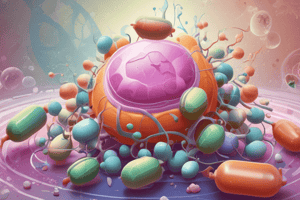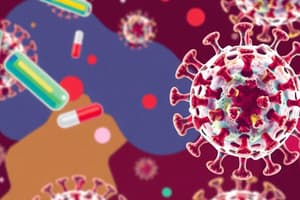Podcast
Questions and Answers
What is the primary mechanism of action of nucleoside analogues?
What is the primary mechanism of action of nucleoside analogues?
- They inhibit the protease enzyme necessary for viral replication.
- They mimic nucleosides to inhibit viral replication. (correct)
- They bind to reverse transcriptase to inhibit viral replication.
- They prevent the fusion of the viral membrane with the host cell membrane.
Which of the following stages of the viral life cycle is targeted by neuraminidase inhibitors?
Which of the following stages of the viral life cycle is targeted by neuraminidase inhibitors?
- Release (correct)
- Uncoating
- Translation
- Transcription
What is a major factor contributing to antiviral drug resistance?
What is a major factor contributing to antiviral drug resistance?
- Prolonged treatment duration
- Increased frequency of antiviral drug administration
- Increased dosage of antiviral drugs
- Poor patient adherence to treatment regimens (correct)
What is the mechanism of action of fusion inhibitors?
What is the mechanism of action of fusion inhibitors?
What is a consequence of mutations in the viral genome?
What is a consequence of mutations in the viral genome?
What is the target of protease inhibitors?
What is the target of protease inhibitors?
Match the following antiretroviral therapy classes with their mechanisms of action:
Match the following antiretroviral therapy classes with their mechanisms of action:
Match the following consequences of antiviral drug resistance with their descriptions:
Match the following consequences of antiviral drug resistance with their descriptions:
Match the following antiretroviral therapy classes with their targets:
Match the following antiretroviral therapy classes with their targets:
Match the following HAART treatment goals with their descriptions:
Match the following HAART treatment goals with their descriptions:
Match the following mechanisms of antiviral drug resistance with their descriptions:
Match the following mechanisms of antiviral drug resistance with their descriptions:
Match the following challenges of HIV treatment with their descriptions:
Match the following challenges of HIV treatment with their descriptions:
Flashcards are hidden until you start studying
Study Notes
Definition and Mechanism
- An antiviral drug is a medication that inhibits the growth or replication of viruses.
- Antiviral drugs work by targeting specific stages of the viral life cycle, such as:
- Entry: Preventing the virus from entering host cells.
- Uncoating: Inhibiting the release of viral genetic material.
- Transcription: Blocking the transcription of viral genetic material.
- Translation: Interfering with the translation of viral proteins.
- Release: Preventing the release of new viral particles.
Types of Antiviral Drugs
- Nucleoside analogues: Mimic nucleosides, the building blocks of DNA and RNA, to inhibit viral replication. Examples: Acyclovir, Zidovudine.
- Non-nucleoside reverse transcriptase inhibitors:Bind to reverse transcriptase, an enzyme necessary for viral replication. Examples: Nevirapine, Efavirenz.
- Protease inhibitors: Inhibit the protease enzyme, which is necessary for viral replication. Examples: Ritonavir, Indinavir.
- Fusion inhibitors: Prevent the fusion of the viral membrane with the host cell membrane. Examples: Enfuvirtide.
- Neuraminidase inhibitors: Inhibit the release of new viral particles. Examples: Oseltamivir, Zanamivir.
Antiviral Drug Resistance
- Mechanisms of resistance: Mutations in the viral genome, reduced drug uptake, or increased drug efflux.
- Factors contributing to resistance:
- Inadequate dosage or treatment duration.
- Poor patient adherence to treatment regimens.
- Infection with multiple viral strains.
Antiviral Drug Classes by Virus
- HIV: Nucleoside analogues, non-nucleoside reverse transcriptase inhibitors, protease inhibitors, fusion inhibitors.
- Herpesviruses: Nucleoside analogues (e.g., Acyclovir).
- Influenza: Neuraminidase inhibitors (e.g., Oseltamivir).
- Hepatitis: Nucleoside analogues, interferons, and direct-acting antivirals (e.g., Sofosbuvir).
Studying That Suits You
Use AI to generate personalized quizzes and flashcards to suit your learning preferences.




